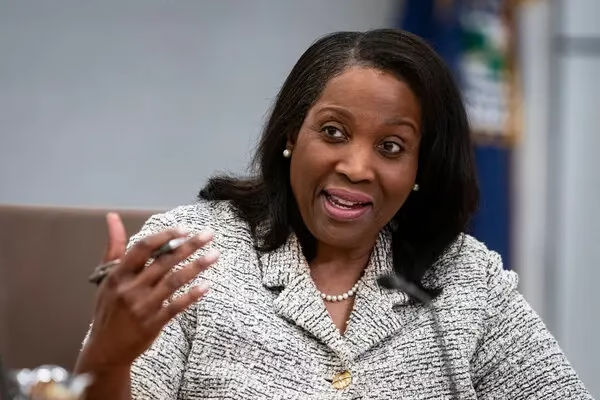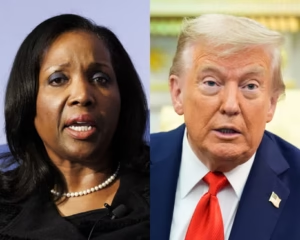The federal appeals court on Monday delivered a major setback to President Donald Trump, ruling that Lisa Cook will remain on the Federal Reserve’s Board of Governors. The decision prevents, at least for now, the White House from reshaping the most powerful monetary institution in the country to its advantage.
Since its creation in 1913, the Federal Reserve has never faced such an attempt at political interference. As the Associated Press reported, “the White House campaign to unseat Cook marks an unprecedented bid to reshape the Fed’s Board of Governors.”
On August 25, Trump announced Cook’s removal, citing allegations of mortgage fraud. But last week, U.S. District Judge Jia Cobb ruled the measure unlawful, holding that Fed governors may only be dismissed “for cause” and only for misconduct committed during their term.
Unmoved, Trump immediately appealed. His lawyers argued that the allegations — though predating her 2022 appointment — “indisputably call into question Cook’s trustworthiness and whether she can be a responsible steward of interest rates and the economy.”
In a 2-1 decision, however, the appeals court found that Cook’s fundamental rights had been violated, noting that she was not given the opportunity to formally respond to the charges.
Allegations and Denials
At the center of the case is Bill Pulte, a Trump ally who accused Cook of fraudulently claiming two primary residences in 2021 to obtain better mortgage terms. The White House labeled this as “mortgage fraud.”
Cook has categorically denied the allegations. Documents obtained by the Associated Press appear to weaken the government’s case. In May 2021, she listed her Atlanta condominium as a “vacation home” in a loan estimate. In a separate security clearance form, she described it as a “second home.”
The ruling comes just as the Federal Reserve prepares to lower its benchmark rate from 4.3 percent to 4.1 percent, as signaled last month by Fed Chair Jerome Powell. Financial markets have already priced in the cut: mortgage rates and car loans have declined in anticipation and could fall further if the decision is confirmed, the AP noted.
But economists warn of the dangers of political interference. “If the Fed falls under the control of the executive branch, it could artificially keep its key rate too low to satisfy Trump’s demands,” analysts said, according to the AP. That, they argue, would risk fueling inflation and pushing long-term borrowing costs higher, weighing on households, businesses, and the federal government.
Trump, for his part, has repeatedly demanded that the Fed slash rates to 1.3 percent — a level rejected by every current Fed governor and most independent economists.
Even as Cook secured a legal victory, Trump’s allies made gains elsewhere. On Monday, Senate Republicans confirmed Stephen Miran to a vacant seat on the Fed’s board, giving the administration fresh influence over the central bank.
Lisa Cook as a Symbol
Beyond the institutional struggle, Lisa Cook embodies a historic figure. The first Black woman to serve as a Fed governor, she is a Marshall Scholar, an Oxford and Spelman College graduate, and has taught at Harvard’s Kennedy School of Government and Michigan State University.
Her 2022 appointment sparked political controversy, with some Republicans questioning her qualifications. Yet she has since become an emblem of diversity and economic expertise within the institution.
The Cook case also revives a long-standing but critical debate: the Fed’s independence from political power. Economists broadly agree that a central bank free of political pressure is better positioned to take unpopular but necessary steps, such as raising rates to curb inflation.
Trump’s intervention, seeking to remove a governor he views as opposed to his policy goals, is seen as a dangerous breach. If the Supreme Court were to side with him, it would create a precedent enabling future presidents to reshape the central bank at will.
For now, Cook will take her seat at Tuesday’s meeting of the Federal Open Market Committee, where the 19 members — seven governors and twelve regional bank presidents — will debate the path of interest rates.
As the Associated Press, cited by Newsweek, concluded, the confrontation “highlights the extraordinary political stakes now surrounding the Fed,” at a moment when the entire nation is watching the cost of living and financial stability with heightened anxiety.
https://ctninfo.com/?p=36889&preview=true
https://www.facebook.com/CaribbeanNewsMedia
Source: AP








